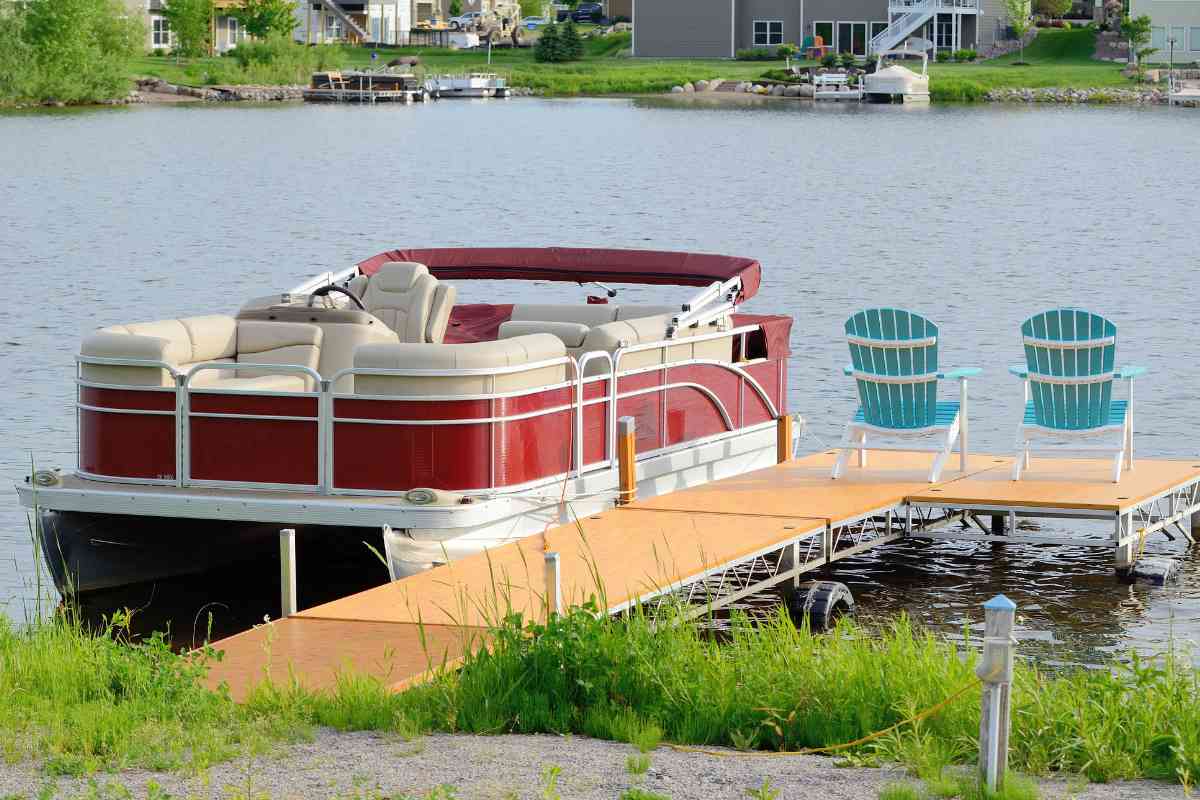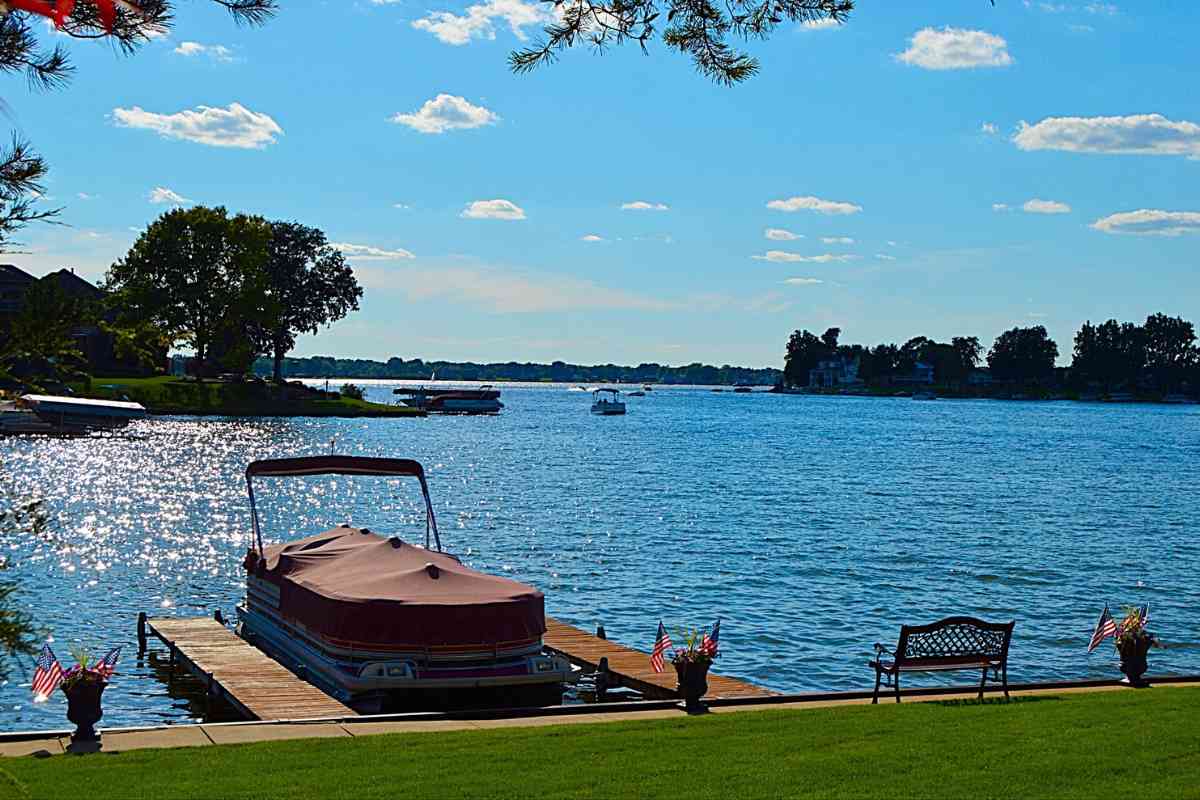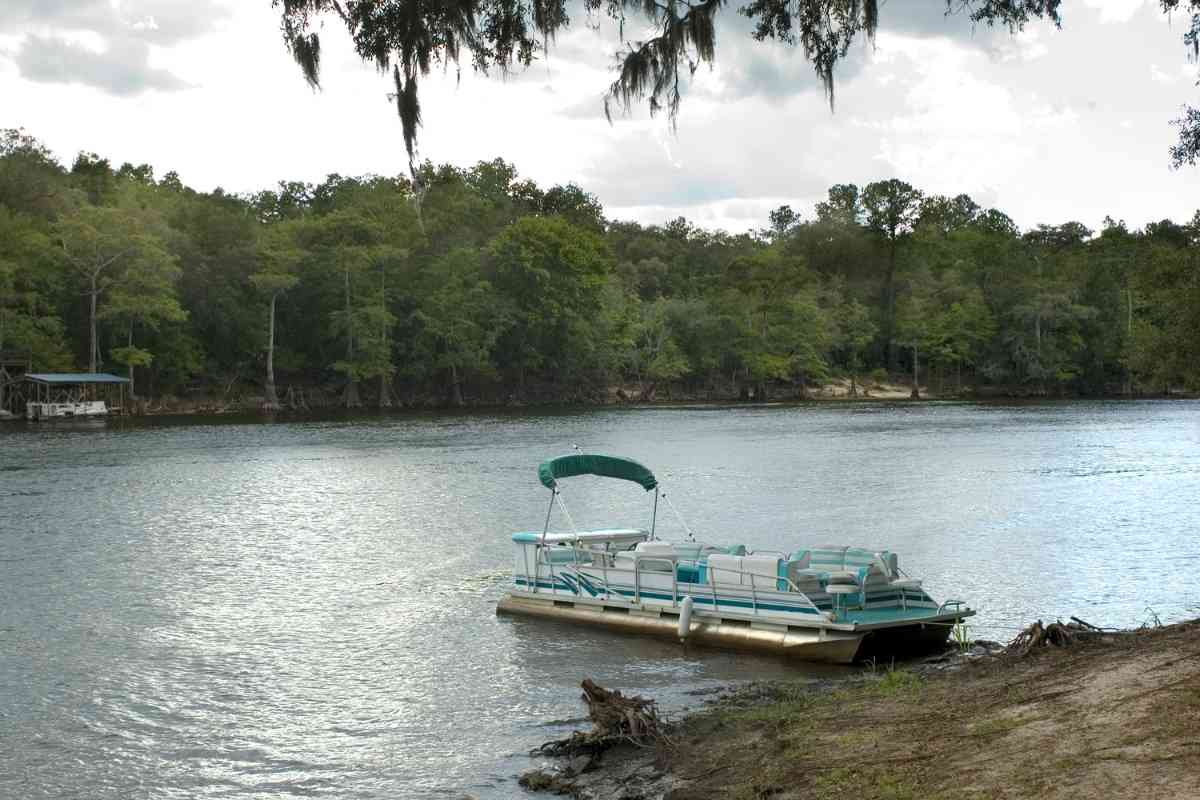Can a Pontoon Boat Sink? Expert Analysis and Facts
Pontoon boats are a popular choice for recreational boating due to their stability and spaciousness. However, some people may wonder if these boats can sink.

Worried about sinking? Pontoon boats aren’t the only hard-to-sink boats out there. check out our guide to what boats are unsinkable.
Can pontoon boats sink?
Pontoon boats can sink, but it’s not very common. Overloading is the most common cause, but uneven weight distribution or water entering the pontoons from leaks or waves can also pose risks. Regular maintenance and adhering to weight limits are essential for safe pontoon boating.
If the weight capacity of the boat is exceeded, it can cause the pontoons to become submerged, leading to a potential sinking. Additionally, if the weight is not distributed evenly, it can cause the boat to become unstable and tip over. Another factor that can contribute to sinking is if water enters the pontoons, either through a leak or from waves splashing over the boat.
In this article, we’ll explore the reasons why pontoon boats can sink and how to prevent it from happening.
Understanding Pontoon Boats: A Comprehensive Guide
Pontoon boats have steadily risen in popularity due to their unique design and multifunctional use. Characterized by their stability and versatility, these boats are a favorite among many water enthusiasts. Let’s dive deeper into understanding these vessels.
Design and Structure
At the heart of every pontoon boat is its distinct design. A flat deck is mounted atop two or more cylindrical pontoons, which are typically filled with air or foam. These pontoons play a pivotal role in the boat’s buoyancy, ensuring it remains afloat even in varying water conditions.

Why Choose a Pontoon Boat?
- Versatility in Activities: Whether you’re an angler looking for the next big catch, a family wanting a leisurely cruise, or an adrenaline junkie seeking watersports, pontoon boats cater to all. Their design allows for a wide range of activities, making every trip unique.
- Customizable Interiors: One of the standout features of pontoon boats is the ability to customize their spacious interiors. From luxury seating to high-end sound systems, the options are vast, allowing boat owners to tailor their vessel to their preferences.
- Safety and Stability: The design of pontoon boats, especially the buoyant pontoons, ensures they remain stable even in choppy waters. This stability makes them less susceptible to capsizing compared to other boat types.
However, it’s essential to remember that no boat is unsinkable. Overloading beyond its capacity, not distributing weight evenly, or any significant hull damage can compromise a pontoon boat’s safety. Always adhere to the manufacturer’s guidelines to ensure a safe boating experience.
What Makes A Pontoon Boat Sink?
While pontoon boats are renowned for their stability, it’s vital to address the often-asked question: Can they sink? The straightforward answer is yes, but with a caveat. Sinking is relatively rare, but certain conditions can increase the risk:
- Excessive Water Intake: Overloading your pontoon boat can cause the boat to sit lower in the water. Combine this with heavy rain, and the boat might struggle to stay afloat.
- Capsizing Risks: Though rare, pontoon boats can capsize. This can result from sudden weight shifts, strong winds, or navigating turbulent waters without caution.
- Pontoons’ Condition: The condition of the pontoons is crucial. Any damage or leaks can compromise their buoyancy, increasing sinking risks. This is why storing your pontoon boat appropriately is so crucial.
Factors That Increase Sinking Risks
- Overloading and Weight Distribution: Everday boat has a weight limit. Exceeding this or not distributing weight evenly can lead to instability.
- Adverse Weather Conditions: Boating during storms or strong winds can be perilous. Waves, especially those created by larger vessels, can pose a threat.
- Regular Wear and Tear: Like any vehicle, pontoon boats aren’t immune to the effects of time. Regular wear or unnoticed damage can make them vulnerable.

Safety Measures to Ensure a Safe Boating Experience
- Adhere to Weight Guidelines: Always be aware of your boat’s weight capacity. Distribute passengers and gear evenly.
- Stay Weather Aware: Before setting out, always check the weather forecast. If you notice darkening skies or increasing winds while out, it’s best to head to shore.
- Regular Maintenance: A well-maintained boat is a safe boat. Regularly inspect your vessel, ensuring the pontoons are in prime condition and addressing any wear or damage promptly.
Pontoon boats, with their blend of comfort, versatility, and stability, offer a unique boating experience. While they come with many advantages, it’s essential to be aware of their limitations. By following safety guidelines and ensuring regular maintenance, you can enjoy all the benefits of your pontoon boat while ensuring safety on the water.
Conclusion
In conclusion, pontoon boats are capable of sinking, but they are less likely to sink than other types of boats due to their design and safety features. However, it is important to follow weight capacity limits, avoid hitting underwater objects, watch the weather, and wear life jackets to prevent pontoon boats from sinking.
Overloading is the main reason why pontoons sink. Since these boats have a large and spacious deck, it is easy to overload them without noticing. When a pontoon is overloaded, and the tubes are low in the water, the boat still appears to be floating, and you will only see the boat is overloaded when you attempt to move.
It is also important to note that anything can sink with enough damage, and the question is how much damage it would take to sink a pontoon boat. Considering how those things are built, it would take significant damage to get it to completely submerge in water.
In most circumstances, pontoon boats offer great stability and will hold up better than other kinds of boats on the water. However, it is still important to be aware of the risks and take precautions to ensure the safety of everyone on board. By following basic safety guidelines and taking care of your boat, you can enjoy a fun and safe boating experience on a pontoon boat.
Frequently Asked Questions
What are some common causes of pontoon boats sinking?
The most common cause of pontoon boats sinking is overloading. Pontoon boats have a weight capacity that should not be exceeded. Other causes of sinking include damage to the pontoons, improper handling, and failure to maintain the boat.
Are there any safety measures to prevent a pontoon boat from sinking?
Yes. Some safety measures include having enough life jackets for all passengers, ensuring that the boat is not overloaded, properly maintaining the boat, and having a bilge pump onboard.
Can overloading a pontoon boat cause it to sink?
Yes. Overloading a pontoon boat is one of the most common causes of sinking. Pontoon boats have a weight capacity that should not be exceeded. Overloading can cause the boat to sit too low in the water and take on water.
What should I do if my pontoon boat starts taking on water?
If your pontoon boat starts taking on water, the first thing you should do is turn off the engine and try to determine where the water is coming from. If the water is coming from a small leak, you can use a bilge pump to remove the water. If the water is coming in rapidly, you should call for help and try to stay afloat.
How does the design of a pontoon boat affect its buoyancy?
The design of a pontoon boat affects its buoyancy by providing a large surface area that displaces water. The pontoons are filled with air, which provides additional buoyancy. The design of the boat also affects its stability and maneuverability.
What are some recommended safety items to have on a pontoon boat?
Some recommended safety items to have on a pontoon boat include life jackets for all passengers, a fire extinguisher, a first aid kit, a whistle or horn, a throwable flotation device, and a paddle. It is also a good idea to have a waterproof flashlight and a radio or other communication device.
